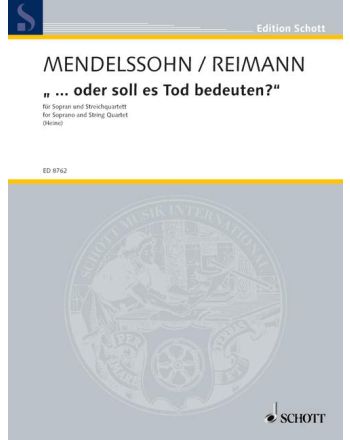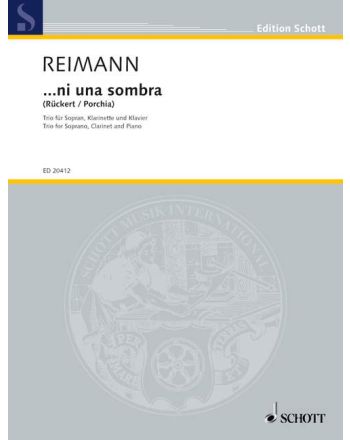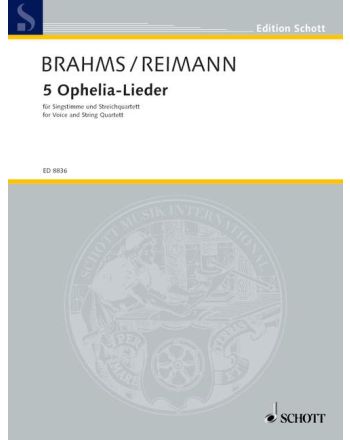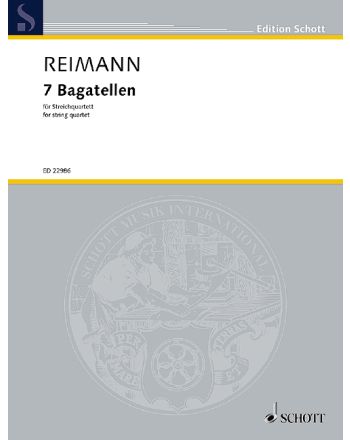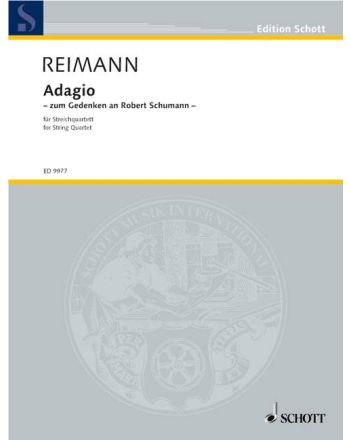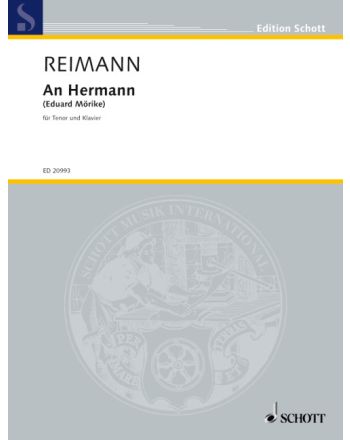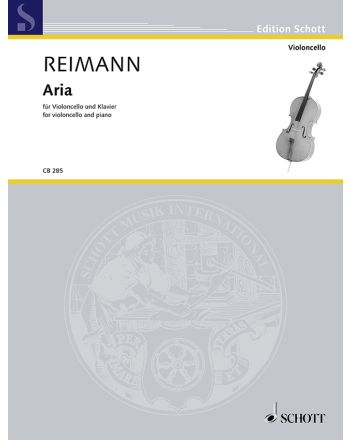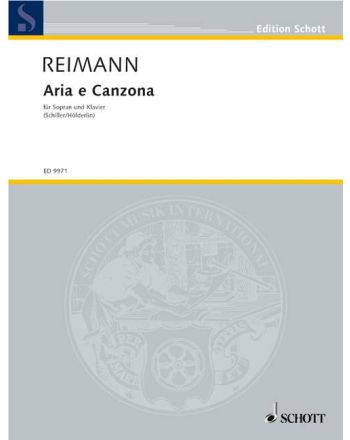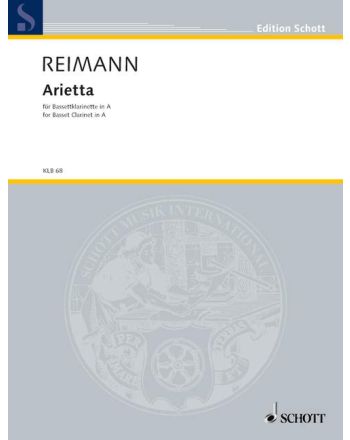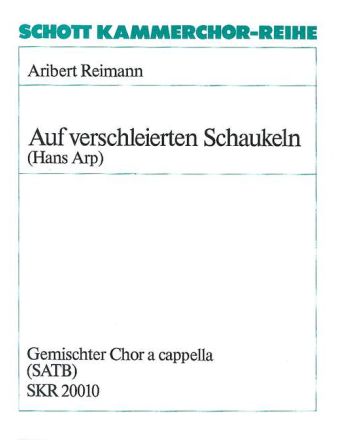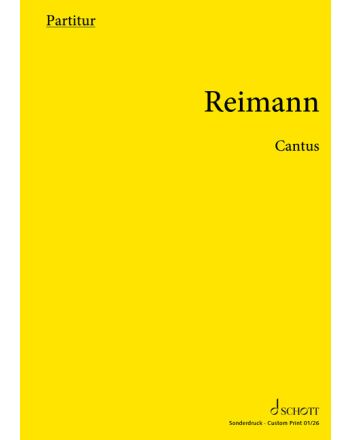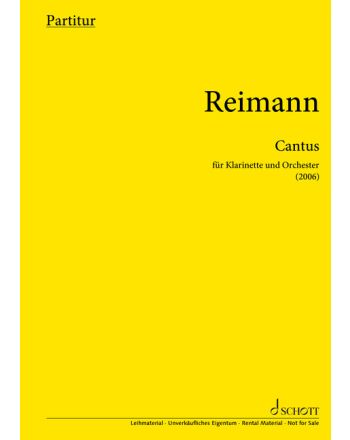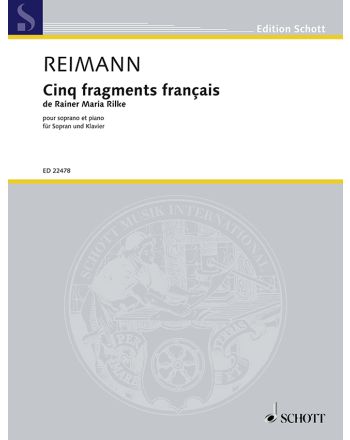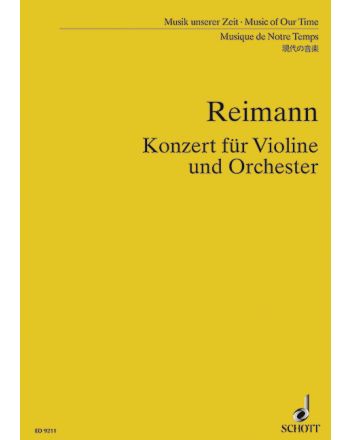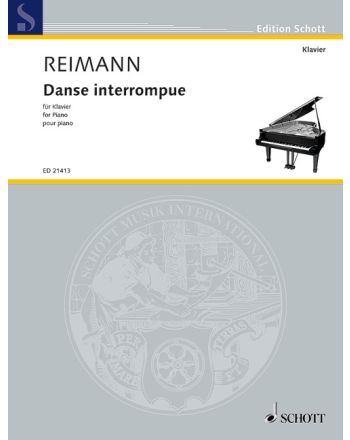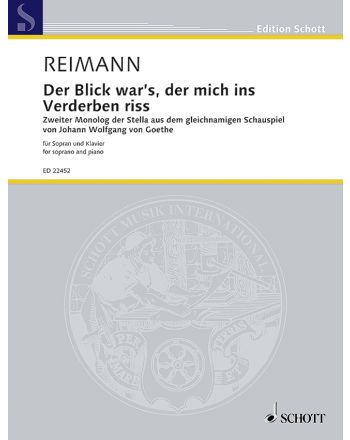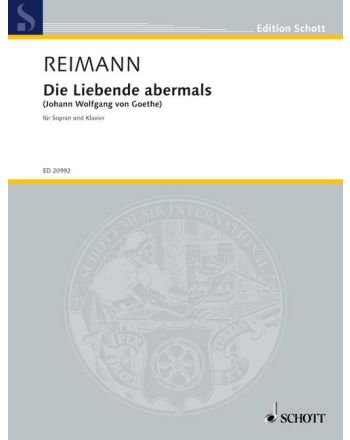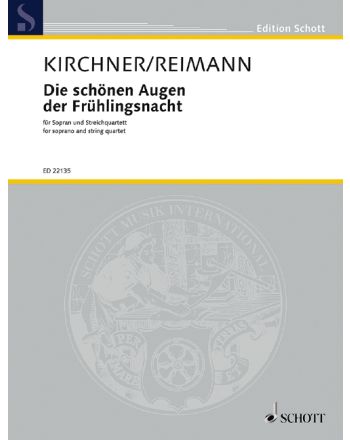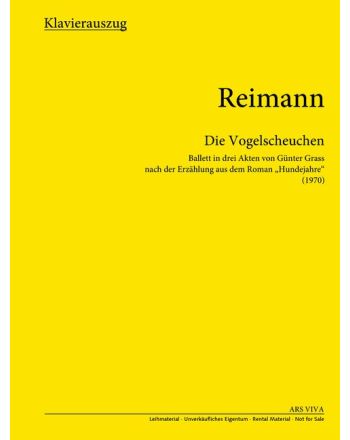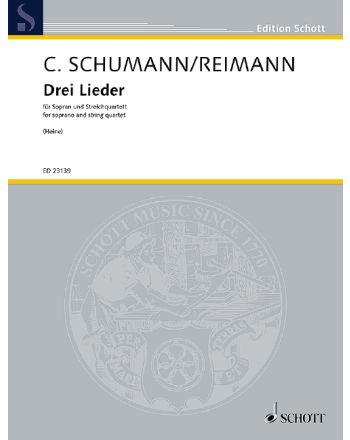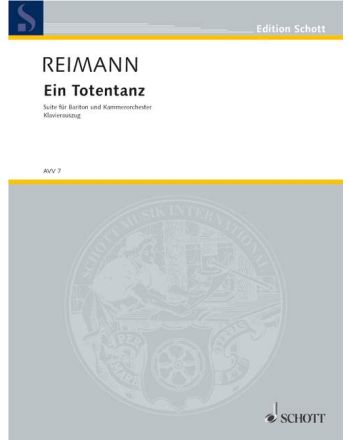
Aribert Reimann
About Aribert Reimann
Aribert Reimann’s music assimilates an essential artistic constellation in the first modern period, namely the issue of the character of a work and the autonomy of art in view of an externally and internally disjointed society. Art can no longer be of comfort … (Wolfgang Rathert)
Aribert Reimann was born on 4 March 1936 in Berlin. He grew up in a musical family; his father was an organist and director of the Berlin State and Cathedral Choir, his mother was a renowned oratorio singer and singing teacher. Reimann composed his first lieder with piano at the age of ten. After having passed his Abitur [higher education entrance examination] in 1955, he worked as repetiteur in the Studio of the State Opera House in Berlin and simultaneously studied composition with Boris Blacher and Ernst Pepping and piano with Otto Rausch at the Academy of Music in Berlin. He gave his first concerts as pianist and lied accompanist in 1957. A year later, he attended the University of Vienna to study musicology. His ballet Stoffreste based on a libretto by Günter Grass received its premiere at the Städtische Bühnen in Essen in 1959. Music theatre and lieder provided the nucleus for Reimann’s further artistic development. As early as 1971, the composer was awarded the German Critics’ Prize for his complete oeuvre up to that date. From 1974 to 1983, he was professor at the Hamburg Musikhochschule with the specialist area contemporary lied and from 1983 in the same function at the Berlin University of the Arts. Until his death on 13 March 2024, Aribert Reimann lived in Berlin.
The affinity for the human voice provides a strong impulse for Aribert Reimann’s compositional activity. Alongside lied settings of texts by authors such as Paul Celan, James Joyce, Joseph von Eichendorff and Louïze Labé, the composer has also produced numerous chamber music works, solo concertos and orchestral works such as Miniatures for string quartet (2004/05), the two Piano Concertos (1961 und 1972), Seven Fragments for Orchestra (in memoriam Robert Schumann, 1988) and the orchestral work Zeit-Inseln (2004).
Reimann’s operatic output began in 1965 with the first performance of Ein Traumspiel based on a text by August Strindberg in Kiel. This was followed by Melusine, based on the play by Yvan Goll, premiered at the Schwetzingen Festival in 1971. With his opera Lear (1978, Bayerische Staatsoper), Aribert Reimann was able to win over not only specialists and critics but also a wider public for his characteristic personal style: the work has been performed internationally in more than thirty productions. With its basis on the play by William Shakespeare, the composer created music with an almost physical directness which is at all times aware of its existence on the borderline to being struck dumb. In 1984, Die Gespenstersonate, also on a text by August Strindberg, was premiered in Berlin and, in 1986, Troades based on the play by Euripides in the version by Franz Werfel. Reimann undertook a further ambitious literary project from 1990 to1992 with his opera Das Schloß based on the novel by Franz Kafka (first performance 1992): the nightmarish and labyrinthine atmosphere of the text is reflected in a chamber musical and fragile texture of the music. The premiere of Bernarda Alba’s House, based on the text by Federico García Lorca, took place at the Bayerische Staatsoper in Munich in 2000. Considered as one of the leading German-speaking opera composers, Aribert Reimann has received a commission from the Vienna State Opera to compose an opera on Medea based on the play of the same name by Franz Grillparzer which has been awarded "World Première of the Year" by German magazine "Opernwelt". His latest music theatre work, L'Invisible, is based on three dramas by Maurice Maeterlink and was premiered in autmn 2017 at Deutsche Oper Berlin.
Aribert Reimann has received numerous honours and awards, including the Grand Cross for Distinguished Service of the Order of Merit of the Federal Republic of Germany in 1985, the 'Prix de composition musicale de la Fondation Prince Pierre de Monaco' in 1986, the Bach Prize of the Free Hanseatic city of Hamburg in 1987, the Order of Merit of the State of Berlin in 1988, in 1991 the Frankfurt Music Prize, the Grand Cross with Star for Distinguished Service of the Order of Merit of the Federal Republic of Germany in 1995, the Goldene Nadel from the Dramatiker Union in 2002, the Berlin Art Prize for Music and the medal of the Free Academy of Arts in Hamburg in 2002, the Arnold Schönberg Prize in 2006 and the Ernst von Siemens Music Prize in 2011. In 2018, he was awarded the German theatre award DER FAUST for lifetime achievement, and in 2024 the GEMA Musikautor*innenpreis. In 1999, Reimann was appointed as Commandeur de 'L'Ordre du Mérite Culturel de la Principauté de Monaco’. He is also a member of the Order Pour le Mérite for science and the arts and honorary member of the German Music Council.
Worklist
Gallery








Chronology
World premiere of the opera "Ein Traumspiel" at the Bühnen der Landeshauptstadt Kiel
World premiere of the opera "Melusine" at the Schwetzingen Festival
Critics Award for Music (1970) for his Oeuvre and particularly for the Music of the ballet "Die Vogelscheuchen"
Received the Grand Cross for Distinguished Service of the Order of Merit of the Federal Republic of Germany
Ludwig Spohr Prize of Braunschweig
Music Composition Award of the Prince Pierre Foundation of Monaco
Ernst von Siemens Music Prize
Died on 13 March in Berlin
GEMA-Musikautor*innenpreis for Lifetime Achievement
Products
-
Eight Lieder and one fragment by Felix Mendelssohn BartholdyComposer: Felix Mendelssohn Bartholdy | Aribert ReimannEdition: Score and partsSeries: Edition Schott
Instrumentation: soprano and string quartetProduct number: ED 8762Product TypeIn stockAs low as €46.99Incl. Tax -
Trio for Soprano, Clarinet in A and PianoComposer: Aribert ReimannEdition: Performing scoreSeries: Edition Schott
Instrumentation: soprano, clarinet in A and pianoProduct number: ED 20412Product TypeIn stockAs low as €29.99Incl. Tax -
für Klavier und OrchesterHire/performance materialHire/performance material
-
für Klavier und 19 SpielerHire/performance materialHire/performance material
-
nach Gedichten von Gabriela MistralProduct TypeIn stockAs low as €6.99Incl. Tax
-
Composer: Aribert ReimannMedia Type: Sheet musicInstrumentation: Baritone and PianoLanguage: EnglishProduct number: AVV 13Print editionPrint editionIn stock€17.00Incl. Tax, Excl. Shipping
-
by Johannes Brahms on Lyrics from William Shakespeare’s HamletComposer: Johannes Brahms | Aribert ReimannEdition: Score and partsSeries: Edition Schott
Instrumentation: voice and string quartetProduct number: ED 8836Product TypeIn stockAs low as €19.99Incl. Tax -
for string quartetComposer: Aribert ReimannEdition: Score and partsSeries: Edition Schott
Instrumentation: string quartetProduct number: ED 22986Product TypeIn stockAs low as €30.99Incl. Tax -
Composer: Aribert ReimannMedia Type: Sheet musicEdition: Study scoreSeries: Music Of Our Time
Neun Stücke
Instrumentation: orchestraProduct number: ED 8444Print editionPrint editionIn stock€54.00Incl. Tax, Excl. Shipping -
zum Gedenken an Robert SchumannComposer: Aribert ReimannEdition: Score and partsSeries: Edition Schott
Instrumentation: string quartetProduct number: ED 9977Product TypeIn stockAs low as €15.99Incl. Tax -
Text von Eduard MörikeComposer: Aribert ReimannEdition: Separate editionSeries: Edition Schott
Instrumentation: tenor and pianoProduct number: ED 20993Product TypeIn stockAs low as €14.99Incl. Tax -
for violoncello and pianoComposer: Aribert ReimannSeries: Cello Library
Edition Schott
Instrumentation: cello and pianoProduct number: CB 285Product TypeIn stockAs low as €8.99Incl. Tax -
Texte von Friedrich Hölderlin und Friedrich von SchillerComposer: Aribert ReimannSeries: Edition Schott
Instrumentation: soprano and pianoProduct number: ED 9971Product TypeIn stockAs low as €18.99Incl. Tax -
A Guide to the Stage WorksComposer: Aribert ReimannMedia Type: Promotional materialLanguage: German, EnglishProduct number: KAT 310-99Promotional materialPromotional materialIn stock€0.00Incl. Tax, Excl. Shipping
-
List of Published WorksComposer: Aribert ReimannMedia Type: Promotional materialLanguage: German, EnglishProduct number: KAT 65-99Promotional materialPromotional materialIn stock€0.00Incl. Tax, Excl. Shipping
-
Leben und WerkComposer: Aribert ReimannAuthor: Wolfgang BurdeMedia Type: BookLanguage: GermanProduct number: ED 8544BookBookIn stock€48.00Incl. Tax, Excl. Shipping
-
for basset clarinet in AComposer: Aribert ReimannSeries: Clarinet Library
Edition Schott
Instrumentation: bassettclarinet in AProduct number: KLB 68Product TypeIn stockAs low as €4.99Incl. Tax -
Vol. 1 | Drei KlavierstückePrint editionPrint editionIn stock€20.00Incl. Tax, Excl. Shipping
-
Chorzyklus nach Gedichten von Hans ArpComposer: Aribert ReimannEdition: Choral scoreSeries: Schott Chamber Choir
Instrumentation: mixed choir (SATB) a cappellaProduct number: SKR 20010Product TypeIn stockAs low as €6.99Incl. Tax -
Opera in three actsComposer: Aribert ReimannMedia Type: Sheet musicEdition: Study scoreSeries: Music Of Our Time
Bernarda Albas Haus
Language: GermanProduct number: ED 9876Print editionPrint editionIn stock€71.00Incl. Tax, Excl. Shipping -
Oper in drei AktenComposer: Aribert ReimannMedia Type: Hire/performance materialEdition: Performance materialLanguage: GermanHire/performance materialHire/performance material
-
for clarinet in A and orchestraComposer: Aribert ReimannMedia Type: E-score PDFEdition: ScoreProduct number: DLS 50951-01 Q790543E-score PDFE-score PDFIn stock€19.99Incl. Tax
-
for clarinet in A and orchestraHire/performance materialHire/performance material
-
Composer: Aribert ReimannMedia Type: Sheet musicEdition: Performing score, with alto flute partInstrumentation: flute (alto flute), viola and celloProduct number: AVV 11Print editionPrint editionIn stock€17.00Incl. Tax, Excl. Shipping
-
Composer: Aribert ReimannMedia Type: Sheet musicInstrumentation: cello and pianoProduct number: AVV 16Print editionPrint editionIn stock€24.00Incl. Tax, Excl. Shipping
-
Poème visuel nach dem gleichnamigen "Poème en prose" von Charles BaudelaireComposer: Aribert ReimannMedia Type: Hire/performance materialEdition: Performance materialLanguage: FrenchHire/performance materialHire/performance material
-
for soprano and pianoComposer: Aribert ReimannSeries: Edition Schott
Instrumentation: soprano and pianoProduct number: ED 22478Product TypeIn stockAs low as €12.99Incl. Tax -
Composer: Aribert ReimannEdition: Study scoreSeries: Music Of Our Time
Konzert
Instrumentation: violin and orchestraProduct number: ED 9211Product TypeIn stockAs low as €36.99Incl. Tax -
A collection of new pieces for pianoMedia Type: Sheet musicInstrumentation: pianoLanguage: EnglishProduct number: ED 21470Print editionPrint editionIn stock€10.00Incl. Tax, Excl. Shipping
-
Product TypeIn stockAs low as €4.99Incl. Tax
-
nach dem Roman von Franz Kafka und der Dramatisierung von Max BrodComposer: Aribert ReimannMedia Type: Hire/performance materialEdition: Performance materialLanguage: GermanHire/performance materialHire/performance material
-
nach dem Roman von Franz Kafka und der Dramatisierung von Max BrodComposer: Aribert ReimannMedia Type: BookEdition: LibrettoSeries: Das Schloß
Language: GermanProduct number: BN 3685-40BookBookIn stock€8.00Incl. Tax, Excl. Shipping -
Erste Duineser Elegie von Rainer Maria RilkeComposer: Aribert ReimannMedia Type: Hire/performance materialEdition: Performance materialLanguage: GermanHire/performance materialHire/performance material
-
Zweiter Monolog der StellaComposer: Aribert ReimannEdition: Separate editionSeries: Edition Schott
Instrumentation: soprano and pianoProduct number: ED 22452Product TypeIn stockAs low as €22.99Incl. Tax -
Print editionPrint editionIn stock€16.00Incl. Tax, Excl. Shipping
-
(Ghost Sonata)Composer: Aribert ReimannMedia Type: Hire/performance materialEdition: Performance materialLanguage: GermanHire/performance materialHire/performance material
-
Eine KammeroperComposer: Aribert ReimannMedia Type: Sheet musicEdition: Full and study scoreLanguage: GermanProduct number: ED 8021Print editionPrint editionIn stock€64.00Incl. Tax, Excl. Shipping
-
Eine KammeroperComposer: Aribert ReimannMedia Type: BookEdition: LibrettoSeries: Die Gespenstersonate
Language: GermanProduct number: BN 3687BookBookIn stock€8.00Incl. Tax, Excl. Shipping -
Text von Johann Wolfgang von GoetheComposer: Aribert ReimannSeries: Edition Schott
Instrumentation: soprano and pianoProduct number: ED 20992Product TypeIn stockAs low as €14.99Incl. Tax -
Six Lieder by Theodor KirchnerComposer: Aribert ReimannEdition: Score and partsSeries: Edition Schott
Instrumentation: soprano and string quartetProduct number: ED 22135Product TypeIn stockAs low as €51.99Incl. Tax -
Ballett in drei Akten von Günter GrassHire/performance materialHire/performance material
-
nach Gedichten von Octavio Paz, deutsche Übersetzung von Edith AronComposer: Aribert ReimannMedia Type: Sheet musicEdition: Piano reductionInstrumentation: high voice, flute, harp and celloLanguage: German, SpanishProduct number: BB 5100143Print editionPrint editionIn stock€12.00Incl. Tax, Excl. Shipping
-
in der deutschen Übertragung von Walter JensComposer: Aribert ReimannMedia Type: Hire/performance materialEdition: Performance materialLanguage: GermanHire/performance materialHire/performance material
-
by Clara Schumann based on poems by Heinrich HeineComposer: Clara SchumannArranger: Aribert ReimannEdition: Score and partsSeries: Edition Schott
Instrumentation: soprano and string quartetProduct number: ED 23139Product TypeIn stockAs low as €38.99Incl. Tax -
nach Gedichten von Edgar Allan PoeComposer: Aribert ReimannMedia Type: Hire/performance materialEdition: Performance materialLanguage: EnglishHire/performance materialHire/performance material
-
von Richard Strauss, op. 67 (1918)Composer: Aribert Reimann | Richard StraussArranger: Aribert ReimannMedia Type: Hire/performance materialEdition: Performance materialLanguage: GermanHire/performance materialHire/performance material
-
nach Gedichten von Octavio Paz, deutsche Übersetzung von Edith AronComposer: Aribert ReimannMedia Type: Sheet musicEdition: Set of partsInstrumentation: high voice, flute, harp and celloLanguage: German, SpanishProduct number: BB 5100211Print editionPrint editionIn stock€20.00Incl. Tax, Excl. Shipping
-
für Mezzosopran, Klavier und OrchesterComposer: Aribert ReimannMedia Type: Hire/performance materialEdition: Performance materialLanguage: GermanHire/performance materialHire/performance material
-
SuiteComposer: Aribert ReimannEdition: Piano reductionSeries: Edition Schott
Ein Totentanz
Instrumentation: Baritone and Chamber OrchestraProduct number: AVV 7Product TypeIn stockAs low as €16.99Incl. Tax -
Suite für Bariton und KammerorchesterComposer: Aribert ReimannMedia Type: Hire/performance materialEdition: Performance materialLanguage: GermanHire/performance materialHire/performance material

